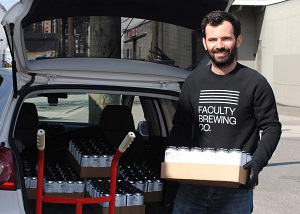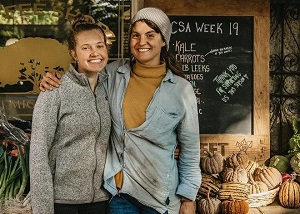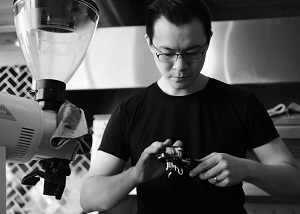Alumni: Pivoting Their Businesses during COVID-19
The COVID-19 situation has affected almost every industry around the world. We checked in with three Faculty of Land and Food Systems entrepreneurs in Vancouver, to see how they are adapting their food and beverage businesses in these times.
Mauricio Lozano, Master of Food Science, 2009
Faculty Brewing Co. – www.facultybrewing.com
Mauricio Lozano, founder of Faculty Brewing Co., was ahead of the game when he decided to begin limiting the capacity in his tasting room in early March. “We realized we were part of the problem, as it was difficult to ensure physical distancing in a place that was designed for conversation,” said Lozano. In anticipation of reduced foot traffic, Lozano launched an online store on his website. Customers were able to have their craft beer delivered to their homes, but there were struggles with limited staff to deliver over a large geographical area.
“Over the years I’ve made great connections with other breweries in the city, and because we were all facing similar problems, we decided to pool our resources and find an innovative solution.”
That solution was www.beervan.ca, launched on March 22. BeerVan allows customers to order products from multiple breweries and beverage producers in the same order, and have everything delivered together. With more resources at their disposal, BeerVan was able to send out more drivers (including staff who would otherwise have worked in the breweries) and deliver to more cities in Metro Vancouver.
“I’m thrilled with the success of BeerVan so far. It has allowed me to keep most of my staff employed and maintain a revenue stream.”
Elana Evans, Master of Science in Soil Science, 2018
City Beet Farm – www.citybeetfarm.com
Elana Evans and Maddy Clerk have been the co-owners of City Beet Farm since 2016, an urban farm operating on the front lawns and backyards on 14 properties in Vancouver, 0.5 acre in total. Produce is exchanged with homeowners on a weekly basis, as well as with eighty-two members of their Community Supported Agriculture (CSA) program.
“With the growing season underway, we’ve had to implement new practices into our operations in response to the pandemic,” Evans said. “We clean and disinfect surfaces of tools, equipment and frequently touched items around yards regularly. We’ve also limited the amount of people on our farms at any given time, by postponing tours and reducing volunteer hours.”
In previous summers, CSA members could pick up their weekly produce in a market setting, providing a unique opportunity for consumers to interact directly with food growers. Unfortunately, this year City Beet Farm will be moving to a contactless method starting in June when the produce boxes are ready. The details are still in the works.
“This situation has highlighted the fragility of our current food system and the importance of local production. We are learning that in order to survive as a business in this time it is crucial that we remain adaptive, flexible and responsive. Connecting with other businesses and organizations, offering support where we can and being open to change is what resilience looks like.”
Edmond Keung, Bachelor of Science in Food, Nutrition and Health (Food Market Analysis), 2009
Moving Coffee – www.movingcoffee.com
A husband and wife team, Edmond Keung and Shirley Tang are coffee aficionados who began their business in Hong Kong before moving to Vancouver in 2016. They source specialty grade coffee beans from around the world, which they run through a trial-and-error process to find the perfect roast profile to bring out its characteristics. They are among the less than 100 Q-Graders in Canada – individuals with the sensory and coffee knowledge to evaluate the quality of green coffee.
“We’ve had to close our retail coffee bar, where we served espresso-based beverages and filter brewed coffees, as well as whole bean coffee,” said Keung. “Instead, we’ve shifted our focus to online sales. We’re now offering free local deliveries in Vancouver, and shipping across Canada.”
Globally, the coffee bean industry is still adapting to the pandemic, and consumers may notice an increase in cost in the future as farm workers face travel restrictions and less workers are allowed in the fields. Shipment of the final product overseas will also likely face delays.
Still, Keung is finding new ways to connect with customers virtually. “We’ve started a YouTube channel, where we’re sharing some best practices on how we brew our coffees.” You view their videos here.


